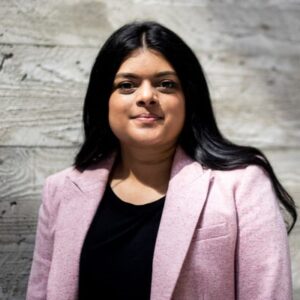 Current mental health statistics are stark, indicating that approximately 35% of college student-aged people report feeling depressed, while rates for anxiety and other mental health conditions soar even higher.
Current mental health statistics are stark, indicating that approximately 35% of college student-aged people report feeling depressed, while rates for anxiety and other mental health conditions soar even higher.
Many students struggle to gain access to quality mental health care. This issue is compounded by a lack of tools to help them quantify their mental health status and implement actionable steps for improvement.
“I’ve seen firsthand the strain that our students go through and the toll that takes on their mental health, and the pandemic has made that even worse,” says Aarti Sathyanarayana, Assistant Professor at Northeastern and Director of the Signal Processing and Artificial Intelligence for Time Variant Health Data Laboratory (SATH Lab).
To combat this mental health crisis, Sathyanarayana and her team at the SATH Lab are developing a digital health app to revolutionize mental health care by empowering students to better understand and improve their mental health.
The team’s work in mental health care has earned them selection as one of the six Fall 2023 Spark Fund awardees.
Digital Phenotyping and Machine Learning-based Mental Health App
Where traditional mental health care relies on subjective self-assessments and generalized constructs, the My Atlas app leverages cutting-edge digital phenotyping, machine learning, and recommendation systems to provide personalized and pragmatic behavioral recommendations tailored to each user’s unique needs.
The technology translates data that is already being collected by smartphones and wearable devices to better understand mental health, including GPS location, heart rate, call and message logs, physical activity stats, and more.
The app also incorporates user-provided information such as demographics, psychometric analysis-based survey results, the Big Five Personality test results, personal goals, and mental health history information.
The app can identify anomalies and trajectories, helping users understand which behaviors positively or negatively impact their health.
For example, a student might feel that they’re not at their best, but they aren’t sure exactly why they’re feeling that way. My Atlas can use their data to help them identify patterns and factors that affect their mental health. If they are feeling especially down, the app can help them identify factors contributing to their feelings and give them actionable steps to improve their wellbeing.
Commercialization with the CRI
The first primary target market for My Atlas is university wellness and mental health programs, where the need for the technology is high. My Atlas is uniquely positioned to address college students’ mental health needs, empowering them to take control of their wellbeing and providing valuable support to care teams at the university level.
With ongoing student research and publication efforts bolstering its scientific foundation, the app is poised to become a cornerstone of university wellness services. As the team prepares to launch a pilot study with undergraduate students, they envision a future where My Atlas is seamlessly integrated into university wellness programs, offering widespread access to mental health care.
“Our hope is that our tool will become a crucial part of university wellness programs and that it will empower students to understand and take control of their own mental health,” says Sathyanarayana. We want students to know that they’re not alone.”
The team will soon announce a waitlist for students interested in testing the app. Students can sign up to help improve the app’s efficacy and shape the results.
The Spark Fund Award
Northeastern CRI’s Spark Fund award partly funds this technology, as the team was selected as one of the Fall 2023 Spark Fund awardees.
Furthermore, the Spark Fund advisors’ invaluable feedback and guidance have equipped the team to navigate challenges while preparing for customer engagement.
“Feedback from the Spark Fund judges allowed us to better understand and plan for the obstacles we would encounter when we go to market,” says Sathyanarayana. “For example, they helped us think through how to retain customers, which can be a challenge with a mental health app requiring customers to engage in positive behavior change.”
Looking ahead, the team envisions a world where checking in on mental health is as commonplace as tracking daily steps — with an important distinction.
“While getting 10,000 steps a day is a noble health goal, it can be an arbitrary goal because different people have different needs. We don’t want to do that for mental health,” says Sathyanarayana. “We want to personalize the experience for our app users.”
Learn More about the Spark Fund
Learn more about Sathyanarayana’s research and the other Spark Award grantees here.
Written by Elizabeth Creason
